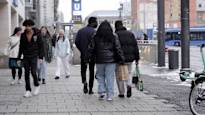Every fourth workers in Germany have a foreign background. Asylum seekers and employees are very confused when discussing immigration.
Munich. Munich, the capital of Bavarian Bavarian, is famous for his masculine leather pants culture and Oktoberfest beer.
The traditional female picture is also visible in the streets here and there. In ads and signs, blonde women have become pushed into stuck vests and wide skirts. Young people are also held by these traditional Dirndl dresses.
However, in recent years, the street scene has changed and there are fewer blondes than in the past decades.
Munich has become more colorful than other German cities. Every fourth newcomer has a foreign background.
Violence is increasing
The reproduction of foreigners is also reflected in politics. The Bavarian people turn deeper into the right extreme.
The anti -immigration is increased by recent violent attacks, several of which have been asylum seekers.
However, there is also more to foreigners violencebut many voters are not interested.
The support of the Social Democrats, Liberals and Greens has deteriorated in Bavaria last day elections four years ago. The popularity of the Christian Democratic CSU, and especially the alternative to the Alternative to Germany, is growing.
Conversation with confusing
Finnish professor is led by Finnish professor of immigration in Germany’s famous IFO Economic Institute Panu Poutvaara. According to Poutvaara, the importance of immigrants for the German economy is crucial.
– A quarter of the German labor force is already an immigrant background, that is, it is quite central, Poutvaara says.
The public debate is bothered by the fact that all immigrants are pushed into the same basket.
– It should be distinguished whether there is talk of immigrants who have already come after German work or those who have received asylum or those who have been rejected.
In the video, Professor Panu Poutvaara explains what mistakes Germany has made and how immigrants could be employed faster.
The negative general tone of the debate also discourages foreigners who would come to work in Germany.
– There are clear regional differences. In Eastern Germany, attitudes towards asylum seekers are much more negative, and there is already a negative effect, Poutvaara says.
There is a bad shortage of doctors and nurses in Germany. Immigrant healthcare professionals are moving to western Germany due to the attitude.
The place of residence matters
Ifon a new study According to immigrant crimes, there is often not a decisive origin but the place of residence.
Foreigners live more often in metropolitan areas with more crime than Germans.
– My own research shows that if asylum seekers are placed in a high level of unemployment, they have a lower probability of being employed, Poutvaara says.
According to Poutvaara, Germany would have room for improvement in the “placement” of refugees.
– If a particular area has high unemployment, it will affect the jobseekers in the lower position, in particular. Asylum seekers are often such marginal jobseekers.
Poutvaara understands the German anger about unauthorized people.
“Rejected asylum seekers also receive social grants and unfortunately crime is also a problem, so it is clearly a burden,” he says.
